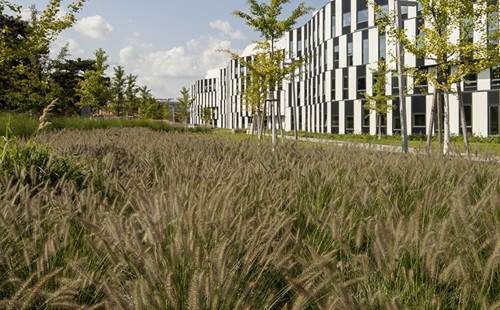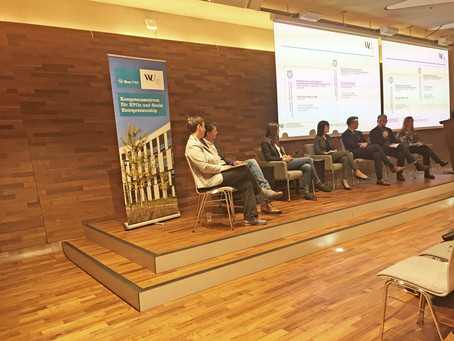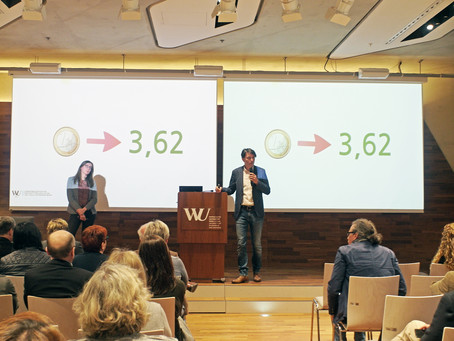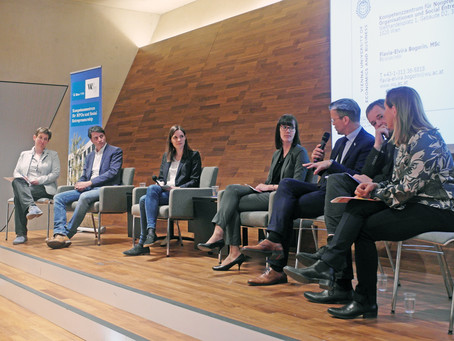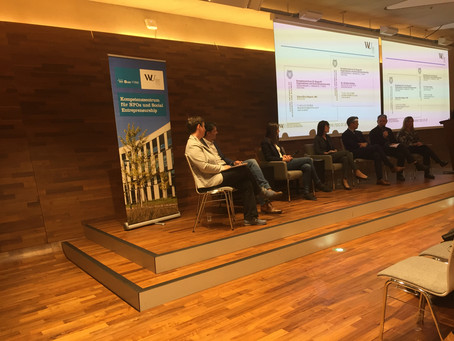Study presentation and panel discussion on the benefits of inpatient geriatric and care facilities in Burgenland
What opportunities and challenges are facing the field of inpatient and mobile care and support in Austria? At a professional symposium on 27 March 2019 at the Vienna University of Economics and Business Administration, Christian Grünhaus (ehem. Schober) and Flavia-Elvira Bogorin presented the results of a current SROI study on inpatient care in Burgenland and compared them with earlier results from Lower Austria and Styria. Afterwards, experts discussed the current situation in the care sector and gave an outlook on future developments in mobile and stationary care.
The NPO Competence Center has repeatedly been able to prove by means of Social Return on Investment (SROI) studies that investments in nursing and care create significant added value for society. A study published in 2015 analysed the social and economic effects of inpatient care and nursing facilities in Lower Austria and Styria. For this purpose, impact chains for the relevant stakeholder groups were created using an SROI analysis. Following the SROI logic, impacts were identified, quantified and monetised. The impacts evaluated in monetary units were finally compared to the investments in the old people's homes and nursing homes. This resulted in SROI values of 2.93 in Lower Austria and 2.95 in Styria.
Some three years later a follow-up study has now been published, which contains an adaptation for the province of Burgenland. Based on the concept of the previous study as well as on the preceding results, an SROI analysis was also carried out on behalf of the Working Group for Home Managers and Care Service Providers of Old People's and Care Homes in Burgenland to evaluate the social and economic benefits of old people's and care homes. The impact model already developed for Lower Austria and Styria was examined for its applicability in Burgenland as well as for its topicality. The stakeholder selection as well as the stakeholder-specific impacts were adapted to the care landscape of Burgenland. In addition, indicators that were used in the previous study to quantify and monetise the identified impacts were reviewed for the follow-up study and, where necessary, revised or supplemented.
Once again, the results of the present study show the high effectiveness and sense of purpose of inpatient geriatric and nursing care facilities in Burgenland. The SROI value for Burgenland's system is 3.62, which is even slightly higher than calculated for Lower Austria and Styria. The most significant positive impacts arise for the stakeholder groups of residents and hospitals, followed by relatives. Together, these three stakeholders account for around 75% of the total impact. The residents benefit in particular from the improvement of their general physical condition due to the reduced probability that they will be affected by various nursing or medical problems during their stay in the inpatient old people's and nursing homes. Ultimately, this also leads to a longer life expectancy, as with appropriate care and support they do not become neglected and thus die earlier. Appropriate care of the residents in the inpatient care system also brings significant benefits to the hospitals by preventing possible misallocations. The relatives benefit in particular from a reduced mental and physical burden and time relief due to the assumption of care activities.
Panel discussion around chances and challenges of the care and nursing system in Austria
Following the study's presentation, experts from the mobile and stationary care sector discussed the results of the Burgenland study, at the same time also considering the findings from Lower Austria and Styria. Furthermore, the expert panel also dealt with the future prospects of the care sector by reflecting on topics such as the demarcation between stationary and mobile care as well as the current role and future potential of alternative forms of care. In addition, many other controversial issues were also addressed, on which different forms of care can have an impact. For example, the question of the migration of workers from Eastern European countries was also critically examined, as well as the advancing digitalization and its possible potential with regard to new forms of care.
Particpants of the podium discussion, moderated by Constanze Beeck, were:
Josef Berghofer, Chairman, ARGE for home directors and nursing service managers of the old people's and nursing homes in Burgenland
Marianne Hengstberger, Managing Director, Wiener Sozialdienste Alten- und Pflegedienste GmbH
Markus Mattersberger, President, Lebenswelt Heim, Federal Association of Old People's and Nursing Homes in Austria
Christian Grünhaus (ehem. Schober), Scientific Director, NPO & SE Competence Center, WU Vienna
Birgit Trukeschitz, Researcher, Research Institute for the Economics of Aging, WU Vienna
Romana Winkler, Managing Director, Styrian Association for Geriatric Care
